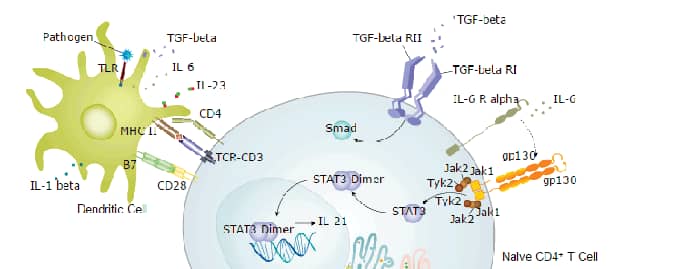Human/Canine IL-23 p19 Antibody Summary
Arg23-Pro193
Accession # XP_538231
Applications
Please Note: Optimal dilutions should be determined by each laboratory for each application. General Protocols are available in the Technical Information section on our website.
Scientific Data
 View Larger
View Larger
Detection of Human and Canine IL‑23 p19 by Western Blot. Western blot shows lysates of human mature dendritic cells (LPS activated), CLL-1390 canine leukocytic round cell neoplasia cell line, and THP-1 human acute monocytic leukemia cell line. PVDF Membrane was probed with 0.5 µg/mL of Sheep Anti-Canine IL-23 p19 Antigen Affinity-purified Polyclonal Antibody (Catalog # AF6250) followed by HRP-conjugated Anti-Sheep IgG Secondary Antibody (Catalog # HAF016). A specific band was detected for IL-23 p19 at approximately 26-28 kDa (as indicated). This experiment was conducted under reducing conditions and using Immunoblot Buffer Group 8.
Preparation and Storage
- 12 months from date of receipt, -20 to -70 °C as supplied.
- 1 month, 2 to 8 °C under sterile conditions after reconstitution.
- 6 months, -20 to -70 °C under sterile conditions after reconstitution.
Background: IL-23
IL-23 p19 (Interleukin 23 p19; also IL-23 alpha) is an 18-20 kDa (estimated) member of the IL-6 superfamily of molecules. It is disulfide-bonded to p40 to form IL-23. IL-23 is secreted by immune-related cell types such as keratinocytes, dendritic cells, macrophages, microglia and monocytes, often following TLR stimulation. It appears to drive Th17 cell development by inhibiting T-bet and FoxP3 production, and to reduce IL-12-mediated IFN-gamma production by CD4+, CD8+ and NK cells. Based on human, mature canine IL-23 p19 is 171 amino acids (aa) in length. It is a alpha -helical molecule that utilizes Cys77 to form an interchain disulfide bond with IL-12 p40. IL-23 p19 does not appear to be released unless dimerized to p40. There are no potential N-linked glycosylation sites on p19. Mature canine IL-23 p19 (aa 23-193) shares 88% aa identity with human IL-23 p19.
Product Datasheets
FAQs
No product specific FAQs exist for this product, however you may
View all Antibody FAQsReviews for Human/Canine IL-23 p19 Antibody
There are currently no reviews for this product. Be the first to review Human/Canine IL-23 p19 Antibody and earn rewards!
Have you used Human/Canine IL-23 p19 Antibody?
Submit a review and receive an Amazon gift card.
$25/€18/£15/$25CAN/¥75 Yuan/¥2500 Yen for a review with an image
$10/€7/£6/$10 CAD/¥70 Yuan/¥1110 Yen for a review without an image




